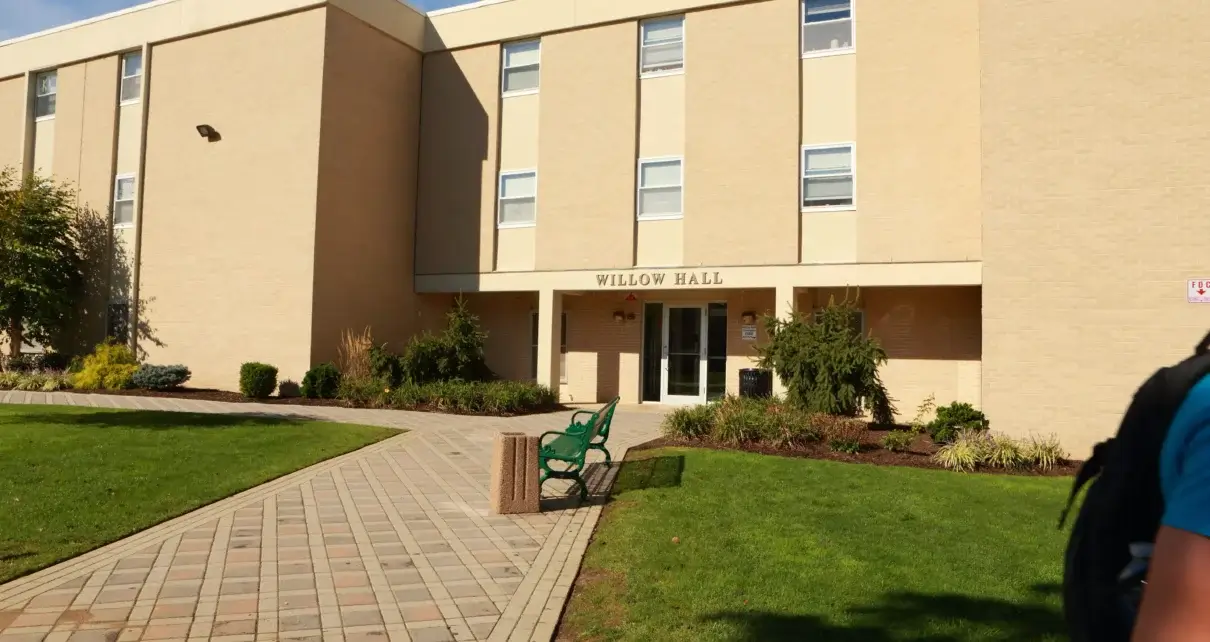Second-year students are required to live on campus at Monmouth University beginning this semester.
With the Class of 2026, Monmouth University has implemented a two-year housing requirement. All sophomores who are not commuting from their primary home are obligated to live on campus with few exceptions.
There are ways around this requirement. Students may request a form by filling out a waiver that will be reviewed by the Housing Requirement Waiver Committee. However, if there is a violation by submitting false or misleading information during this process, students will have to pay a $5,000 fee and will be referred to the Dean of Students’ office, as stated on the University’s website.
Leah Weinstein, a sophomore who has recently been affected by this new rule, said, “Initially, I was upset. I was really hoping to live in a house my second year. However, with time, I became less upset by the new rule. I found living on campus to be more convenient.”
Logan Kettle, a sophomore resident, had a similar outlook. She said, “When I first heard that sophomores had to live on campus, I was a little disappointed. However, after seeing that all sophomores had to live on campus, and that it was required rather than a choice, it made it less of a disappointment and rather a relief.” She smiled and added, “I kind of love it.”
This was the response that administrators like Megan Jones were hoping for. Jones, the Director of Housing Operations, explained , “I think it’s important that sophomores live on campus just to be able to get that [sense of] community… and really getting to do things they might have not been able to do in their first year.”
A sophomore resident at Monmouth, Cades Linder, has felt that sense of community since being back this school year. She explained she has already met a lot of people in the first few weeks of the semester. She acknowledged that would not have been the case had she been living in an off-campus house or an apartment instead of the dorms.
Many students agree with the statement that knowing all sophomores must live on campus makes being in the dorms more enjoyable. Weinstein explained that she appreciates her situation because she is with all her friends, but if there were sophomores living off-campus and she was not, she would be upset. Kettle agreed and added that students still have the opportunity to live off-campus for their junior and senior year.
Cierra Mooney, a junior who lived on campus last school year as a sophomore, is envious at the fact that this requirement was put into place this year rather than last year when it would have affected her and the rest of her class. She said, “I wish it was a requirement last year when I was voluntarily on campus because I honestly feel like it would’ve been so nice to live a full year on campus with all my close friends that I didn’t necessarily have during my freshman year.”
Jones added that freshman year is a lot of firsts as well as navigating your way through college, which is why she feels it is important to spend a second year on campus. She hopes that students are more comfortable to get involved and do things they might have not been able to do in their first year, which is why she imagines adding a second-year housing requirement will be beneficial for student involvement on campus.
So far this year, resident assistant (RA) Caroline DiMaggio has seen on campus involvement increase. She said, “It is exciting to see more of a student presence on the residential side of campus. Having more students in the residence halls means more students coming to building programs and participating in other on campus events for residents.”
Jones believes that living on campus not only gets students more involved in their community but also maximizes their professional and personal development while succeeding academically. She said, “If you stay on campus, then you do better academically, and coming off your first year sometimes you’ll see that you may slide if you’re not focused enough. That’s another reason why they wanted to put that into effect.”
This new requirement has brought many great things to campus and residence life, but there are also downsides that Jones and DiMaggio mentioned. They explained that sophomores living on campus have led to residence halls at maximum capacity, which makes things such as roommate disagreements or room changes if the student is not happy in their current room increasingly difficult. Previously, there were more vacant rooms for roommate switches, but with minimal rooms being available, there is more of a push on the RAs’ side to do roommate mediations to resolve the issue.
This change has also made an impact on Resident Life. DiMaggio commented, “Some buildings have additional RA staff members to accommodate a larger number of residents. For bigger events such as Homecoming and Halloween, the RAs will have more of a presence than previous years to ensure the safety of the residents.”
Jones added that their new policy was not only discussed amongst faculty, but it was also brought to Monmouth’s Student Government. The administrators did not decide to make this change amongst themselves, rather they spoke to the students to get their input on it as well. As Jones points out, they felt it was important to involve the students on issues that would affect them.
It is not unusual for schools to put a two-year on-campus housing requirement. Jones explained that some schools even have implemented a four-year housing requirement, so it’s not abnormal to see a school with at least a first year requirement and some with a sophomore requirement as well.
“We probably have the most students living on campus since the pandemic, which is a great thing,” Jones concluded. “I think if you have a campus that’s full, then you have a vibrant campus and obviously you’re doing the right things.”



